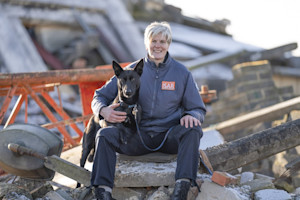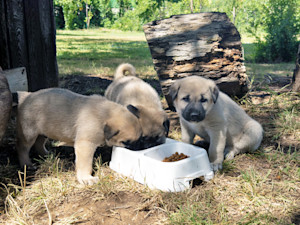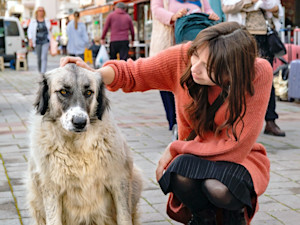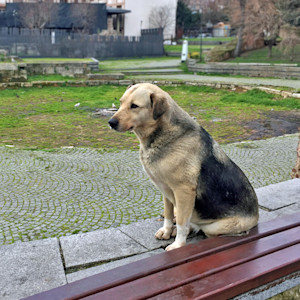The Heroic Man Looking After Lebanon’s War-Torn Pets Was Bombed
Houssein Hamze has been feeding the pets of people fleeing the conflict in Lebanon. Now he’s lost his home and vital resources for the cats, dogs and other animals he cares for
Update – 23 October, 2024: Only a few days after publishing the story of Houssein Hamze’s heroic efforts to feed the pets left behind by those fleeing the conflict in Lebanon, the village he lives in was bombed. His neighbour�’s house was directly hit (thankfully it was empty at the time), but the impact of the bomb left Houssein’s homeopens in new tab destroyed and covered in ash.
By speaking to Hanane Hamad, who lives in Canada and who organised the GoFundMeopens in new tab for Houssein's shelter and following updates on Mashala Shelter's Instagramopens in new tab, Kinship has learned that Houssein had been cooking dinner when the bombopens in new tab hit. His first instinct was to check on his animals and to record the damage, crying as he witnessed the destruction of his own home and the homes around him.
Get (totally free) deals for food, treats, accessories, tech and way more pet parenting must-haves.
He found his dog, Loulou, injured among the damage. Loulou has since been taken to a rescue organisation in Beirut to be cared for.
When he woke the next morning, after having stayed in his brother’s house, he returnedopens in new tab to his own home to see if any animals had survived the bombing. He only found a couple of cats – far fewer than the 50-plus that were living there before the bomb. One cat was found under the rubble near his house, unable to open her eyes and with an injured hip.
Houssein’s white van that he used to drive into villages, letting dogs free from chains and feeding any animals he could find, was also bombed and completely destroyed. All the animal food stock he has accumulated through generous donations was gone, buried underneath the stacks of rubble.
While the shelter, a ten-minute drive from his house, was damaged, the dogs in his shelter, were unharmed.
However, animals closest to where the bomb hit are injured and require veterinary care.
On Sunday, he returned again to his house to see if any of the cats had reappeared following the bombing.
“And they’re coming back,” a post on Instagram read. “They must have sensed the danger before the bombs and ran away. It’s been so heartwarming to see them again and be able to feed them.”
However, he is worried about the cats because although he has recently ordered 100 bags of dry dog food, he couldn’t find any cat food to order.
Even though Houssein has lost virtually everything in the recent bombing, he continues to do what he can to care for the animals still alive. He refuses to give up, searching for animals in the ruins and seeing which ones he can save, and using money received through donations to feed and provide water for dogs, cats, chickens and other animals.
Houssein, and those helping him, are asking people to donateopens in new tab (details below) to help Houssein continue doing the work of providing care for the animals of Lebanon.
Since the start of intensified Israeli airstrikes in Lebanon on 23 September, and the subsequent ground invasion, the UN estimatesopens in new tab that 1.2 million people – 400,000 of them children – have been displaced from their homes. One local man, however, is staying put for the sake of the dogs and other animals left behind amid the conflict.
In 2005, Houssein Hamze returned to his home in southern Lebanon after travelling in Africa. When the 2006 conflictopens in new tab between Lebanon and Israel began, he started housing pets who had been left behind by their parents who were fleeing for their lives.
He never stopped. Now, aged 56, Houssein’s care and rescue mission has ramped up once again thanks to the renewed conflict.
Each day, he wakes between 4am and 5am to feed the animals directly around his own house in southern Lebanon – including several hundred cats, dogs, birds and chickens. After washing himself and making breakfast, he loads dog kibble in his white van and heads to his animal shelter 15 minutes away near Nabatieh, which houses at least 200 dogs. It’s called Mashala Shelteropens in new tab.
“I put water and food out for the dogs,” he tells Kinship. “Some of the dogs are sick or not in good condition. I have a bit of medication to try treating them.”
At noon, he checks his mobile phone. “It is full of messages,” he says.
The messages contain desperate pleas from people who were forced to run away during airstrikes on Lebanon, begging Houssein to find and feed their precious pets.
“They ran away and left behind their dogs,” he says. “When they left, they never thought that they would be gone for so long. Because they thought they’d be coming back, they left their dogs tied up.”
Taking off in his white van, Houssein drives around the nearby villages unchaining dogs, feeding them and giving them water, and removing any fences. “If something happens, they need to be free,” he explains.
Although he is placing himself in danger’s way as Israel continues to bombard Lebanon in search of Hezbollah, Houssein says he doesn’t feel scared.
“God has helped me not to be scared,” he says. “I need to stay with my dogs. I will not leave them.”
He only fears the inability to take care of the animals he fiercely loves, a bombing of his shelter or being kicked off his land and forced to relocate his shelter.
His Instagram is full of videos of dogs, cats and birds being fed with bags of dry food, a welcome relief to so many pet parents thinking about the beloved animals they left behind.
He describes a storyopens in new tab of finding a mother whose puppies fed from her while she lay in pain with an injured neck. “I brought her antibiotics,” he says.
His Instagram is full of stories like this one; of rescue and kindness, resonating with thousands on social media concerned about the pets left behind.
But it isn’t all good news Houssein has to share.
Last week, he found a skinny puppy with a broken leg and put out requests for someone to take him to the vet, as there aren’t any vets currently in south Lebanon.
“No one answered,” Houssein says. “In the morning, he was dead.”
For his work to continue, Houssein depends on generous donations from anyone able to give. Just feeding the dogs at his house and in the shelter costs $200 USD (£150) a day. Since Houssein has a well at his shelter, he doesn’t have to purchase water, but costs have been soaring as he travels to surrounding villages to provide food and water to animals.
“I am receiving donations of food and money, but it needs to keep coming or I won’t be able to continue,” he says.
His white van recently broke down and through donations, he was able to buy one very similar to the old one.
“I wanted the same one because now the dogs know it,” he says.
After the war, Houssein hopes to build a “decent shelter” for his dogs, rather than the loosely constructed premises he uses now.
“I want to have a proper shelter for the dogs so I can continue helping them,” he concludes.
As the conflict rages on in the region, Houssein continues to provide a glimmer of hope for the animals left behind, and the families who have left their homes to flee the danger. His selfless work ensures that the innocent lives caught in the crossfire aren’t forgotten. However, he cannot do it alone.
Donations, support and awareness are crucial to keeping Houssein’s mission alive. Houssein currently depends on two women outside of the country to help him with donations, as it’s not possible to have a PayPal or GoFundMe for people in Lebanon. If you do have the means to donate right now (and we get it, finances are stretched for many) these two women have opened a GoFundMeopens in new tab and PayPalopens in new tab that supporters can donate into. When there is enough money, all the money is sent via Western Union or Tap directly to Houssein.






